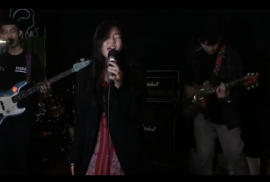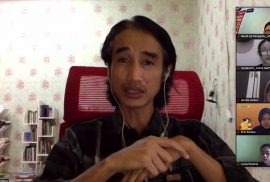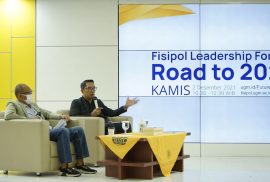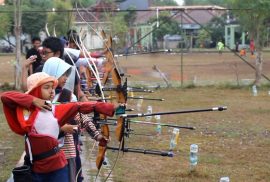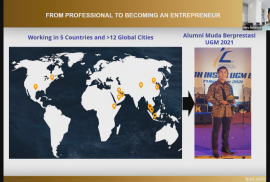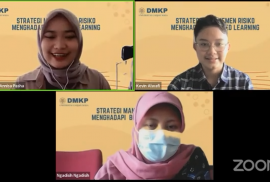Yogyakarta, December 5th 2021─This year is a special moment for the HI Art and Music Festival or HIATUS. The art event from UGM International Relations students, which was previously scheduled to be held annually, had to suffer a setback due to the COVID-19 pandemic last year, which caused two HIATUS to be held this year. After successfully opening early 2021 with the implementation of HIATUS in the first online format, then last March, HIATUS closed 2021 with a second online event, which ended with the highlight of the event on Saturday-Sunday (4-5/12).
Yogyakarta, December 4th 2021─The Student Council of the Department of Social Development and Welfare (KAPSTRA) Fisipol UGM held the third Saba Desa Webinar through Zoom Meeting on Saturday (4/12). The topic discussed was “Questioning the Welfare: How Long Can Buruh Gendong Last?”. On this occasion, KAPSTRA invited M. Berkah Gamulya (The Initiator of the Public Kitchen For Female Buruh Gendong Jogja), Isah Ponira (Manager of Buruh Gendong Paguyuban Sayukrukun) and Astrid Ningtyas F. (Alumni of PsDK 2017) as the speakers.
Yogyakarta, December 2nd 2021─The Faculty of Social and Political Sciences (FISIPOL) of Universitas Gadjah Mada (UGM) held the inaugural FISIPOL Leadership Forum: Road to 2024. On this occasion FISIPOL invited the Governor of West Java, Ridwan Kamil, and a lecturer of FISIPOL UGM, Mada Sukmajati, as speakers.
The event was opened by the Dean of FISIPOL UGM, Wawan Mas’udi, who explained that the idea of the FISIPOL Leadership Forum event was political leadership in Indonesia which came from many sources of leadership due to the democratic and decentralized system.
Yogyakarta, December 1st 2021─The Faculty of Social and Political Science UGM received a visit from The Faculty of Ushluhuddin and Adab of UIN Sultan Maulana Hasanuddin (SMH) Banten on Monday (29/11) at Fisipol UGM Auditorium Room on the 4th floor.
Fisipol UGM’s Vice Dean of Finance and Human Resources, Nurhadi, opened the event and gave an opening speech in an event attended by the Dean of UIN SMH Ushuluddin and Adab Faculty, Dr. Mohamad Hudaeri and his staff. In his opening speech, Nurhadi talked about Fisipol UGM’s profile that has six study programs and several units under it. Furthermore, Nurhadi said that Fisipol UGM is open for collaboration in the academic, research, and other aspects.
Yogyakarta, December 1st 2021─The Department of Communication Studies UGM held a Different Arena of Communication practitioner class titled Analyzing Women and Their Roles in the Journalism Disruption Era. This class talked about the vulnerability of female journalists in the digital journalism era with Uni Lubis and moderated by Zainuddin Muda Z. Monggilo, a lecturer in UGM Communication studies as well as the lecturer for the class.
Uni, who is currently the Editor in Chief of IDN Times and the Head of Indonesia Female Journalist Forum, felt that the change in the digital era creates opportunities as well as challenges for female journalists. This change creates a 24/7 cycle of news that demands an all-time readiness, both in the aspect of news production as well as consumption. Readers used to passively consume the information given by the media, but now readers can decide which information they’d like to know and find supporting data from the internet.
November 29th 2021─As aspiring professional journalists, 60 students of the Communication Studies Department from 15 universities in Indonesia joined the inclusive journalism training focused on the issue of women, children, and disabled people. The online training was held by the Department of Communication
“Women, children, and disabled people belong to a group that has been deeply impacted by the COVID-19 pandemic. However, they have not got sufficient media coverage. In this training, students will analyze the status quo to create an inclusive media coverage,” Novi Kurnia said (26/11), the coordinator of the “Advancing Inclusive Journalism Education in Indonesia: Lessons from the COVID-19 Pandemic” program.
However, if the aim is to seek profit, there is a general condition where clubs, especially League 1, are not yet profitable. This is worsened with the pandemic where there is little to no income other than the subsidy from PT LIB (Liga Indonesia Baru).
“It is true that soccer is a popular sport in Indonesia and I know that those new owners are soccer fans, so at the very least they know how to manage a soccer team,” Hasani said.
Akmal said that the emergence of new clubs needs to be celebrated positively. Clubs get investments from popular people which at the very least can create a positive image out of soccer in the future. The problem with the new investors is related to the weak business security which is related to how we can make them feel comfortable with the industry so they want to continue to invest.
Yogyakarta, November 26th 2021─The tight competition for fresh graduates of undergraduate college programmes to enter the world of work is an unavoidable problem. Not only hard skills, but this must be addressed by strengthening soft skills in students. To support students in having good soft skills, the Department of Public Policy Management in collaboration with PolDev held a program entitled “Young Professional Training & Development”. Carrying the topic “Personal Branding Management in the Social Networking Era”, the activity was carried out through the Zoom Meeting platform. They presented Heru Sutatyo, a Strategic Management Consulting who also serves as CEO of ACE Team & Strategic Investor, as a speaker.
Yogyakarta, November 25th 2021─Along with the development of the pandemic which began to decline, face-to-face learning policies began to be discussed by universities. However, on the other hand, there is a dilemma for both lecturers and students caused by online habits for almost two years. Therefore, the Department of Public Policy Management (PPM) of the Faculty of Social and Political Sciences of UGM held a webinar about risk management. This webinar, which was held via Zoom and YouTube, aims to find out how the university’s risk management strategy is to deal with blended learning. This webinar presented lecturer representatives, Dr. Eng. Ngadisih, STP., M.Sc., who is also part of the Center for Innovation and Academic Studies (PIKA) of UGM, and student representatives, M. Kevin Alwafi, a student of the Department of PPM of UGM.
Yogyakarta, November 23rd 2021─The Department of Sociology of FISIPOL UGM held a Guest Lecture with the topic “Radicalization and Radicalism of Youth Diversity” on Tuesday (23/11). This lecture was taught by Dr. Noor Huda Ismail who is currently a Visiting Fellow of RSIS at Nanyang Technological University. The event which took place through the Zoom Meeting was attended by around 170 students. Talking about radicalization, actually joining a terrorist group is a process. Men and women experience different experiences when joined, including reasons for staying or leaving terrorism. Some want to look masculine by staying behind to defend oppressed Muslims. Some then return to their origins to open military camps and pass on their knowledge to the young people.

